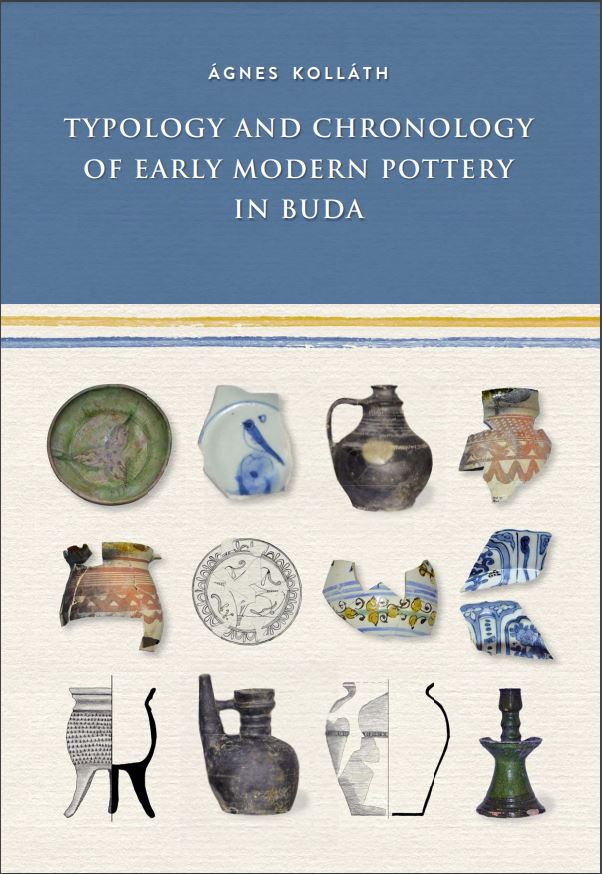- Kolláth Ágnes: Typology and chronology of Early Modern pottery in Buda.
Budapest, Archaeolingua – HUN-REN Bölcsészettudományi Kutatóközpont,
Régészeti Intézet, 2023.
344 p. : ill; 29 cm.
ISBN 978-615-5766-65-7 - CONTENTS
-
I INTRODUCTION
Pages: 7–8 -
II RESEARCH HISTORY
Pages: 9-12 -
THE SITE AND THE PROCESSED FEATURES
III.1 The settlement history of Szent György tér
III.1.1 The geography and early settlement history of Szent György tér
III.1.2 From the 13th century to the moving of the Royal Court to Buda
III.1.3 From the 15th century to the Battle of Mohács
III.1.4 From 1526 to the recapture of Buda from the Ottomans
III.1.5 From the recapture of Buda to the middle of the 19th century
III.2 The processed features and their environment
III.2.1 Sándor Palace (Franciscan Monastery)
III.2.2 No. 3 Szent György tér (south of the former Ministry of National Defence) and Színház utca
III.2.3 Szent György tér, south-western area (Royal Stables)
Pages: 13–42 -
IV METHODOLOGY
IV.1 Antecedents and problems
IV.2 Terminology and the methods of description
IV.3 Chronological questions
Pages: 43–50 -
V KITCHENWARE
V.1 Pots, lids and other cooking vessels
V.1.1 Lead-glazed cooking vessels with yellowish-reddish fabric
V.1.2 Lead-glazed and/or slip-painted cooking vessels with whitish fabric
V.1.3 Slipped and lead-glazed cooking vessels with reddish fabric
V.1.4 Other fast wheel-thrown lead-glazed cooking vessels
V.1.5 Unglazed cooking vessels and milk jugs with coarse reddish fabric
V.1.6 Unglazed Cooking Vessels with reduction firing
V.1.7 Fast wheel-turned, unglazed, conical lids
V.1.8 Slow wheel-turned cooking pots and lids
V.2 Baking plates and baking lids
V.2.1 Baking plates
V.2.2 Baking lids
V.3 Other shapes
V.3.1 Jug turned on the slow wheel
V.3.2 Basket-handled jar, “rötyke”
Pages: 51–132 -
VI TABLEWARE AND LIQUID CONTAINERS
VI.4 Faience and porcelain
VI.4.1 Near and Middle Eastern faience
VI.4.2 Chinese porcelain
VI.5 Tin- and lead-glazed Hutterite-style pottery
VI.6 Central European-type tableware and liquid containers
VI.6.1 Ceramics with light fabric, single or multi-coloured lead-glaze coating, and cut-glazed decoration
VI.6.2 White pottery with painted bands
VI.6.3 Central European-type ceramics with red fabric with a monochrome or coulé (run) lead-glaze
VI.6.4 Slipware with reddish fabric
VI.6.5 Vessels with white fabric and a lathe-turned base
VI.6.6 Marbled ware
VI.7 Ottoman-type, slipped and lead-glazed tableware, liquid containers, and storage vessels
VI.8 Unglazed liquid containers and tableware fired red and grey
Pages: 133–230 -
VII OTHER POTTERY WARES
VII.9 Chamber pots
VII.10 Money boxes
Pages: 231–232 -
VIII SUMMARY
VIII.1 Connections through time and space
VIII.1.1 Chronology
VIII.1.2 Local production and trade connections
VIII.2 Data on settlement history
VIII.2.1 Dating of the objects
VIII.2.2 The evaluated objects within the Ottoman Era history of the Szent György tér area
Pages: 233–240 -
REFERENCES
Pages: 241–266 -
LIST OF ILLUSTRATIONS
Pages: 267–272 -
FIGURES
![]()




